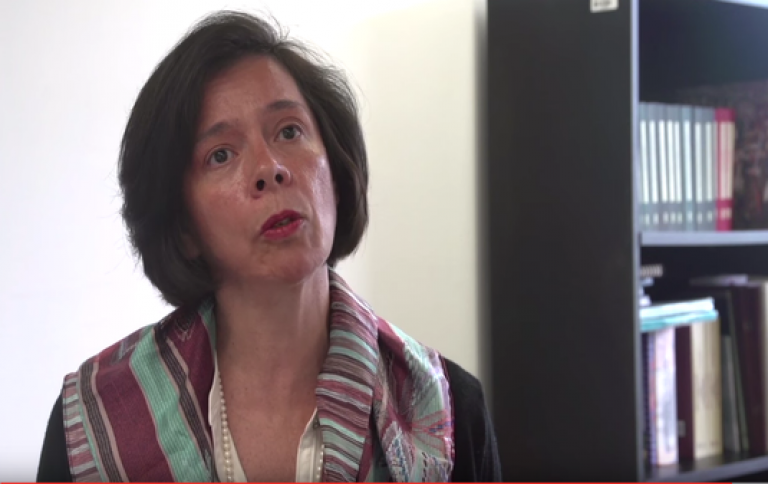Prospects for Change: The International Drug Control Regime and Human Rights
7 March 2016
Miguel Herrero Cangas (MSc Global Governance and Ethics) on a GGI keynote lecture with Dr Monica Serrano and Marie Nougier.

Dr. Monica Serrano joined us at the UCL Global Governance Institute to share her insights on drug control policy, one of the most important transboundary problems of our age. She was joined by Marie Nougier, of International Drug Policy Consortium (IDPC), who expanded on Dr. Serrano's points and brought IDPC's expert perspective to bear on the topic.
The talk was impressively broad and deep in its coverage, providing an excellent crash course on international drug control policy and human rights. Both Serrano and Nougier conveyed the fundamentals to understand the upcoming UN General Assembly Special Session (UNGASS) on Drugs which will be held on 19-21 April 2016.
Prof. Serrano's talk delved into the roots of the problem of global drug control and its relation to the ongoing human rights crises in Latin America and which is currently engulfing Mexico. She argued that the massive spike in criminal violence is the product of the development of, and discordant interaction between, the drug control and the human rights regimes.
The rationale of the drug control regime is driven by two main functions: to eliminate recreational drug use and to ensure the right to use drugs for medical purposes. But, as Marie Nougier pointed out, drug control policy has traditionally focused almost exclusively on the first obligation, while neglecting the second. Furthermore, a lack of coherence and coordination between the human rights and drug control regime has resulted in a lack of dialogue across these two distinct policy and academic communities, as well as policy prescriptions which often cut against realising drug control while also respecting human rights protections.
The crux of Prof. Serrano's exposition lies in trying to re-imagine effective and human rights-respecting approaches to addressing the persistent compliance gap across both the human rights and drug control domains. Although recent history demonstrates significant advances for human rights protection in Latin America, this is coupled with one of the highest homicide rates (28 to 30 per 100,000) in the world (average: 8 per 100,000). Drug control policies have either not worked or indeed served to exacerbate the challenges posed by illicit drugs sales and organised crimes in a globalised market place. To illustrate this failure, Prof. Serrano pointed to the "price paradox". Initially, prohibition policies were advocated for on the basis that this would ensure the price of illegal substances would become prohibitively expensive. However, over time, prohibition has actually led to a sustained decrease in the street price of drugs.
Furthermore, prohibition has empowered criminals both financially, through the illegal drug trade, and coercively, by providing them with the means to arm themselves with highly sophisticated weaponry. This process has led to what Prof. Serrano termed a "lethal nexus of organised crime, narco-trafficking and terrorism" most visible in Colombia and Mexico, but operating in various jurisdictions throughout the region. The drug control policies pursued by various political administrations to essentially respond through military force have also taken a massive toll on human rights. Measures such as extended detention, extradition, or the use of military means to combat drug trafficking, have fanned the flames of this crisis in Mexico and Colombia.
Prof. Serrano argued that there are parallels between the Colombian and Mexican situation, and that Mexico has many cautionary lessons to learn from the extended Colombian experience with criminal violence in the context of drug-trafficking. However, it is also incumbent on observers to reflect on important differences as well, specifically in terms of the nature of violence across these two settings (which Serrano discusses at length in this article, in Spanish). However, it is undoubtedly the case that prohibition and the so-called "war on drugs" have served to severely undermine democratic and human rights practices in both countries. Indeed, Prof. Serrano contends that the Mexican descent into a "war on drugs" under President Calderon in 2006 effectively ended a fragile but real process of democratization following 71 years of one-party rule.
The UNGASS meeting on drugs this April is an important opportunity to shift the terms of the debate in the drug control regulatory regime. However, notwithstanding the abject failure of current policy prescriptions, neither Serrano nor Nougier were optimistic that a change in global drug control policy would be forthcoming. Indeed, Nougier predicted that serious faultlines between reformist government delegations (such as Brazil) and a reactionary group of states (led by Iran) would likely lead to gridlock in the negotiations, with fatal consequences for the outcome of the session given that UNGASS decisions are taken by consensus. Both speakers agreed that real change will require sustained mobilisation by a wide range of pro-reform actors in local political systems.
This event was co-hosted by the UCL Global Governance Institute, UCL Institute of the Americas, UCL Institute of Advanced Studies and Centro de Estudios Legales y Sociales (CELS).
 Close
Close


